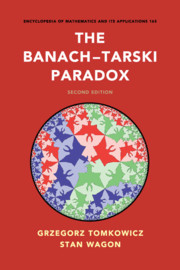Description
The Banach–Tarski Paradox (2nd Ed., Revised edition)
Encyclopedia of Mathematics and its Applications Series
Authors: Tomkowicz Grzegorz, Wagon Stan
The Banach–Tarski Paradox seems patently false. The authors explain it and its implications in terms appropriate for an undergraduate.
Language: English
Subject for The Banach–Tarski Paradox:
Approximative price 48.38 €
In Print (Delivery period: 14 days).
Add to cart
Publication date: 09-2019
Support: Print on demand
Support: Print on demand
Description
/li>Contents
/li>Biography
/li>
The Banach?Tarski Paradox is a most striking mathematical construction: it asserts that a solid ball can be taken apart into finitely many pieces that can be rearranged using rigid motions to form a ball twice as large. This volume explores the consequences of the paradox for measure theory and its connections with group theory, geometry, set theory, and logic. This new edition of a classic book unifies contemporary research on the paradox. It has been updated with many new proofs and results, and discussions of the many problems that remain unsolved. Among the new results presented are several unusual paradoxes in the hyperbolic plane, one of which involves the shapes of Escher's famous 'Angel and Devils' woodcut. A new chapter is devoted to a complete proof of the remarkable result that the circle can be squared using set theory, a problem that had been open for over sixty years.
Part I. Paradoxical Decompositions, or the Nonexistence of Finitely Additive Measures: 1. Introduction; 2. The Hausdorff paradox; 3. The Banach–Tarski paradox: duplicating spheres and balls; 4. Hyperbolic paradoxes; 5. Locally commutative actions: minimizing the number of pieces in a paradoxical decomposition; 6. Higher dimensions; 7. Free groups of large rank: getting a continuum of spheres from one; 8. Paradoxes in low dimensions; 9. Squaring the circle; 10. The semigroup of equidecomposability types; Part II: Finitely Additive Measures, or the Nonexistence of Paradoxical Decompositions: 11. Transition; 12. Measures in groups; 13. Applications of amenability; 14. Growth conditions in groups and supramenability; 15. The role of the axiom of choice.
Grzegorz Tomkowicz is a self-educated Polish mathematician who has made several important contributions to the theory of paradoxical decompositions and invariant measures.
Stan Wagon is a Professor of Mathematics at Macalester College, Minnesota. He is a winner of the Wolfram Research Innovator Award, as well as numerous writing awards including the Ford, Evans, and Allendoerfer Awards. His previous work includes A Course in Computational Number Theory (2000), The SIAM 100-Digit Challenge (2004), and Mathematica® in Action, 3rd edition (2010).
Stan Wagon is a Professor of Mathematics at Macalester College, Minnesota. He is a winner of the Wolfram Research Innovator Award, as well as numerous writing awards including the Ford, Evans, and Allendoerfer Awards. His previous work includes A Course in Computational Number Theory (2000), The SIAM 100-Digit Challenge (2004), and Mathematica® in Action, 3rd edition (2010).
© 2024 LAVOISIER S.A.S.
These books may interest you

The Banach–Tarski Paradox 112.79 €

Measure TheorySecond Edition 60.12 €

Measure TheorySecond Edition 84.39 €

